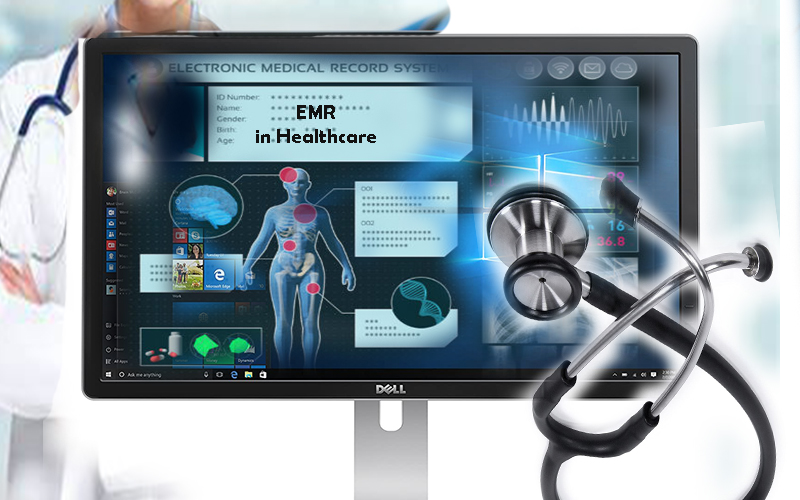Future of EMR in Healthcare: An EMR is a digitized version of a patient’s medical record that includes medical history, test results, prescriptions, and other pertinent information.
The technology that supports the healthcare business is changing at a fast pace. In recent years, electronic medical records (EMR) have grown in popularity and utilization. An EMR is a digitized version of a patient’s medical record that includes medical history, test results, prescriptions, and other pertinent information.


Table of Contents
Trends in EMR
In recent years, there has been a steady increase in the usage of EMR systems. According to Grand View Research, the global EMR market is estimated to reach $42.4 billion by 2027, increasing at a CAGR of 5.3% from 2020 to 2027. The following are some of the trends that are propelling the rise of EMR systems.
Cloud-based EMR Systems
Because of their scalability and cost-effectiveness, cloud-based EMR data systems are becoming increasingly popular. Cloud-based solutions enable healthcare practitioners to access patient data from any device that has an internet connection, thereby improving patient care and provider cooperation. Furthermore, cloud-based systems eliminate the need for on-site IT infrastructure, saving healthcare organizations money on hardware and upkeep.
Artificial Intelligence (AI) and Machine Learning (ML) Integration
AI and machine learning (ML) technologies are rapidly being incorporated into EMR systems. These technologies can assist healthcare practitioners in identifying patterns and trends in patient data, which can lead to better diagnosis and treatment. Moreover, AI and ML may be used to automate administrative activities such as appointment scheduling and reminders, freeing up time for healthcare practitioners to focus on patient care.
Mobile EMR Systems
Mobile EMR systems are gaining popularity because they enable healthcare practitioners to view patient data while on the go. Mobile EMR systems are compatible with smartphones and tablets, making them an appealing alternative for healthcare practitioners who need to access patient data while away from their offices.
Innovations in EMR
Apart from the trends described above, other EMR developments are expected to affect the future of healthcare. The following are some of the most important EMR advancements.
Patient Portals
Patient portals are gaining popularity because they enable patients to view their medical information and engage with healthcare professionals online. Patients can utilize patient portals to make appointments, obtain prescription refills, and ask questions about their treatment. Moreover, patient portals can promote patient engagement by allowing individuals to play a more active part in their care.
Blockchain Technology
Blockchain technology is being investigated as a means of increasing the security and accuracy of EMR systems. Blockchain is a distributed ledger that may be used to securely and transparently record transactions. This technology may be used to guarantee that patient data is accurate, secure, and only available to those who are allowed to see it. Moreover, blockchain can aid in the prevention of fraud and the integrity of patient data.
Virtual Reality (VR) and Augmented Reality (AR)
VR and augmented reality (AR) technologies are being investigated as a means of improving medical education and training. Medical operations and surgeries may be simulated using VR and AR, allowing healthcare practitioners to practice and enhance their abilities in a safe and controlled setting. Moreover, VR and AR may be utilized to improve patient education by allowing patients to learn more about their ailments and treatments.
Challenges in EMR
Despite the numerous advantages of EMR systems, certain hurdles must be overcome for them to be successful. The following are some of the most pressing issues in EMR.
Interoperability
Interoperability is one of the most difficult difficulties in EMR. Many healthcare providers utilize multiple EMR systems, which can make sharing patient data between providers problematic. Using common standards for EMR systems, such as the HL7 FHIR (Fast Healthcare Interoperability Resources) standard, can promote interoperability.
Data Security and Privacy
With EMR systems, data security, and privacy are key considerations. Healthcare providers must guarantee that patient data is safe and not accessible to unauthorized individuals. Furthermore, providers must adhere to privacy requirements such as HIPAA (Health Insurance Portability and Accountability Act), which requires healthcare providers to safeguard patient data and ensure patient confidentiality.
User Adoption
EMR systems can be complicated to use, which can lead to provider resistance. Training is required for providers to use EMR systems successfully and efficiently. Moreover, EMR systems must be created with the user experience in mind to be more intuitive and user-friendly.
Conclusion
With trends and improvements that are expected to improve patient care and provider cooperation, the future of EMR in healthcare is bright. Cloud-based systems, AI and ML integration, and mobile EMR systems are among the themes driving EMR system growth. Patient portals, blockchain technology, virtual reality, and augmented reality are just a few of the developments that will undoubtedly define the future of healthcare.
Nevertheless, difficulties like interoperability, data security and privacy, and user acceptance must be solved. EMR systems can change the healthcare business and enhance patient outcomes by tackling these obstacles and continuing to develop.











